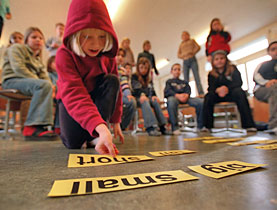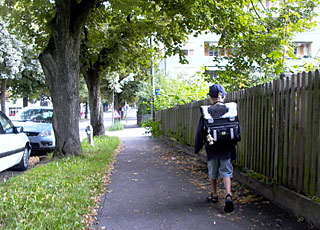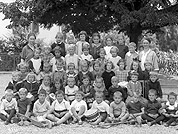Early English helps Swiss children learn French

German-speaking children who learn English first find it easier to learn French later, a study has found.
Reversing the learning order would probably have the same effect, the researchers say in their report, emphasising the benefits of introducing new languages at a young age.
Critics of the introduction of two new languages in primary school argue that it overstretches the children. But the study “Early English – excessive demand or opportunity?”, carried out for the Swiss National Science Foundation, indicates that pupils benefit from exposure to more than one language.
The study examined how well 30 primary school classes, who had already started English, subsequently fared with French. It also tested 20 classes where the children had not previously had English lessons.
The research was carried out in the period 2005 to 2008 by experts from the Central Switzerland University of Teacher Education in the central cantons of Obwalden, Schwyz and Zug for the first type of class and in Lucerne in the second.
Fast track
It was shown that children benefitted from their previous language knowledge when it came to learning a second new language, in this case French. Pupils who had begun English in third class at the age of nine or ten understood French written and spoken texts better after one year of study than those who had learned only French.
The head of the study, Andrea Haenni Hoti, explained that this better performance was thanks to experience acquired in learning the first foreign language. Learners of a third language can refer back to the second language as well as to their mother tongue. They have a broader range of language comparison at their disposal.
“Existing language knowledge helps in the learning of foreign languages. Children with a good level of German can learn English and French better,” Haenni Hoti told swissinfo.
She added that home knowledge of languages such as Albanian and Portuguese, both large immigrant groups in Switzerland, would also help children in German-speaking schools when they came to learn French. Children who grow up bilingual have an additional advantage in aural comprehension.
The children in the study preferred English to French. However, the researchers believe that they would have had similar results if French had been taught before English.
Motivation
The early English lessons had no influence on the children’s later motivation to learn French. It remained the same as for those taking French as their first new language.
The researchers point to other grounds for motivation. The better the child perceived their knowledge of French to be, the more motivated they were to learn. Girls were overall more motivated than boys.
The study also showed that monolingual children were less motivated to learn French than those who were multilingual.
Weaker students came out worse in the language tests but Haenni Hoti does not see this as an argument to limit the teaching of foreign languages.
“Should we hold back the majority from learning two other languages just because a minority is overloaded?”
Stressed?
The majority of children enjoy language classes, despite the fact that one in four of them said they were sometimes afraid of making mistakes and they felt stressed. “There are about as many children who sometimes feel under-challenged,” Haenni Hoti said.
The researchers have no evidence to suggest that underprivileged children fare worse at learning languages; however, they said opportunities were not equal.
Children from families who put more resources into education also have an advantage in learning French. When language learning is not encouraged at home, this has a negative impact on the acquisition of a second or third language – a problem that cannot be solved by schools.
Or as Haenni Hoti puts it: “If you don’t fight poverty you are accepting that children from this kind of background will grow up without equal opportunities.”
swissinfo, based on an article in German by Etienne Strebel
The Conference of Cantonal Education Directors, the national body that agrees on schooling policy, decided in 2004 that primary school children would learn two new languages.
Some German-speaking regions are applying the model of English from third class (age 9 or 10) and French from fifth class (age 11 or 12).
Other German-speaking cantons such as Bern, Solothurn and Basel introduce French first.
In French-speaking Switzerland, German is introduced in third class.
The national research programme “Multilingualism and language skills in Switzerland” (NFT 56) is researching the country’s traditional language diversity (four national languages), which has made multilingualism a normal feature of Swiss society.
On the one hand this leads to problems for schools and society, on the other hand it opens up opportunities for the language resources of Switzerland.
Since 2006 the NFP56 has been operating on a government mandate researching the basic principles for the preservation, fostering and use of Switzerland’s languages.
Most of the studies within the programme are nearing completion or have already been concluded.

In compliance with the JTI standards
More: SWI swissinfo.ch certified by the Journalism Trust Initiative





You can find an overview of ongoing debates with our journalists here. Please join us!
If you want to start a conversation about a topic raised in this article or want to report factual errors, email us at english@swissinfo.ch.